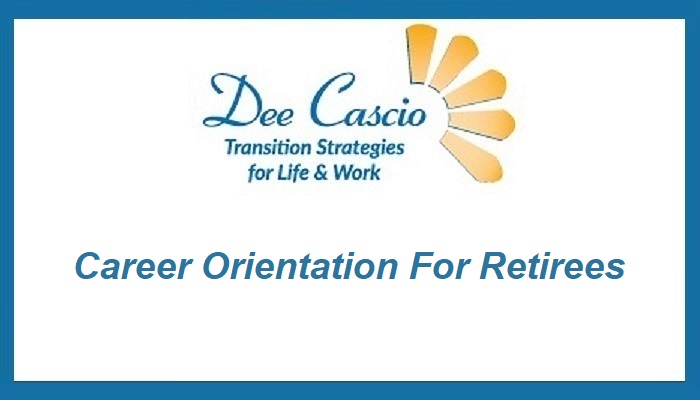Career orientation for retirees is not the first thing that comes to mind when people talk about retirement. Finances, travel, and leisure pursuits top the list.
As a Lifestyle Retirement Coach, I am always interested in hearing stories about people’s ideas and plans for their retirement. Recently, I was talking to a friend who said that her father, who is a 62-year-old electrical engineer, was planning to retire in about a year. Apparently, his retirement plan consists of moving to Florida because that is where his best friend is. However, he has absolutely no idea what he will do once he is there. His daughter commented that he won’t last more than 6 months before he is back to work. She is quite concerned about how he will handle this important transition.
Her dad’s story reminded me of when my father retired. My father began his career as a teacher in a one-room school in upstate New York and had worked his way to becoming a principal of the largest elementary school in the city that we grew up in. One day he was a very successful full-time employee and the day he retired, he had nothing to do except play golf, travel once or twice a year, and do handy-man work around the house. He and my stepmother spent 6 months in New York and the winter months in Florida doing basically the same activities. My dad belonged to the local Rotary club in each location but was not very active.
It is important to note that money was not an issue for my father because he planned well financially for his retirement. However, while he had spent decades working on his financial plan, he had never given much thought as to how he would actually spend his time in retirement. With his life experience, education, and wisdom, I always thought that his skills would have been so valuable to many people as an employee or volunteer. Career orientation for retirees was not on his mind.
In January 2008, the first wave of the 78 million baby boomers turned 62 years old. They became eligible for Social Security and began creating a long-term imbalance in the number of working and retired Americans. In 2008, the average age for first retirements was 57.5. By 2022, the average had risen to 61 and a Gallup survey showed the actual average retirement age of their respondents was 66. This number may continue to rise along with the age at which one can collect full Social Security benefits.
As baby boomers leave the work force, they are creating an unprecedented exodus of skilled and talented workers. Without recareering knowledge or career orientation for retirees, what will these retirees do with their time, skills and talent? How will employers compensate for this loss of skilled/professional labor?
Planning for this stage of life, which is part of everyone’s developmental process, can be daunting or it can be the beginning of creating more exciting choices of activities in life. There are so many possibilities that can enhance a dream retirement of work, leisure, volunteerism, travel, education, hobbies, etc. Most of us have worked for a very long time and may need support and direction to realize the choices that are available to us. For the first time, we are looking at this next phase without “shoulds” or “have to’s” yet realizing that there is no road map. Although many baby boomers have seen their parents experience a retirement to leisure, the current retirement trend is to create a retirement with other activities in addition to leisure activities and this may include some type of work. Now is the time to consider how you can reorient your career skills to make a positive difference in the world.
